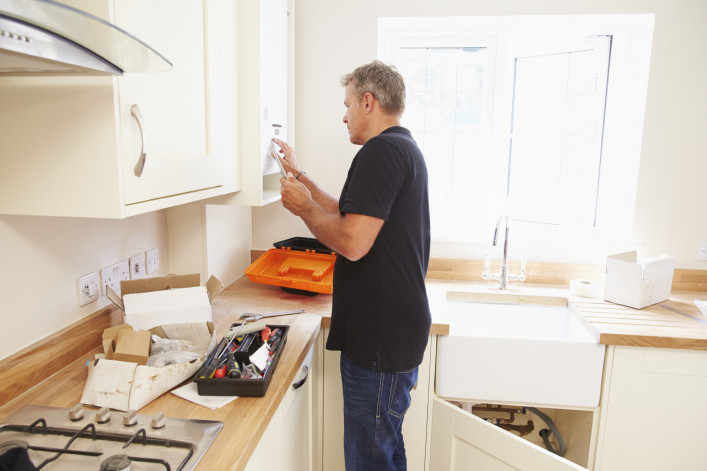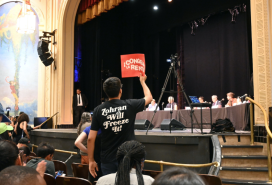Choosing the right home inspector can help you avoid the suburban (and city) money pit

This weekend's New York Times featured a story that had us appreciating our NYC rental lifestyle. The piece, entitled "When a Dream House Becomes a Money Pit," told of a young family that moved from the Upper West Side to New Jersey in 2012, buying a $650,000 house.
But since moving in, problems have mounted (including windows without insulation, a malfunctioning water heater, cracking tiles), forcing repairs and an expansion that'll cost about half the purchase price.
The article points out a few things that the first-time buyers missed, including the fact that the seller immediately took their asking-price offer without counter-offering, which might have been a red flag that went unnoticed. They also never saw that the house had been featured in a Times story about the previous owner saving it from extreme disrepair.
And the buyer, Steven Hicks, said he wishes he'd noticed that the inspector "was a little bit more apologetic than he should have been."
Tom Walsh, owner of the Long Island-based All Aspects Home Inspections, says he's not sure the inspector did anything wrong in that situation. "A lot of the problems that were in the story, I'm not sure a home inspector would pick up on," he says. For instance, ceiling beams had been placed where a wall was removed, and the beams were notched to include run wiring and pipes, reducing their load-bearing ability. But since that was all hidden inside the ceiling, it's not something an inspector would have looked for.
"We need to leave the house the way we found it, we can't open up ceilings and walls," says Kenneth Lee of Green Apple Home Inspections. "Even a structural engineer isn't going to open the ceiling," says Lee.
Lee tells us that if he sees something like a ceiling bowing, he'll recommend calling in a structural engineer. While a seller is unlikely to open up a ceiling, wall or floor, a structural engineer can at least tell you how much it might cost to fix any problem they suspect.
These are issues he's often seen in New York City, says Lee, since houses and buildings are often over 80 years old. Home inspection are needed particularly in brownstones (where there's no large co-op or condo board keeping an eye on things and likely no large reserve fund for repairs), and for apartments on the the top floor of smaller buildings, where leaks and weather damage can be more common. (For more on NYC home inspections, read this.)
"Of course, in co-ops and condos, you don't have the personal liability you do in brownstones and houses, but I've certainly gone into condo buildings and brownstones and found, for example, termite damage, and that affects the structure of a building. Maybe not on the third floor, but certainly lower down."
Anyone else remember 1980s classic "The Money Pit"? Credit: Fandango.
Walsh recommends buyers ask for a Certificate of Occupancy when buying a new house, which shows if all the work that's been done is up to code. "If you think anything wasn't part of the original structure, you want to make sure it was installed and inspected properly in the past," he says.
And when hiring an inspector, make sure yours doesn't have too much skin in the game. "The best thing is to find a recommendation from a friend or from your attorney," says Walsh. An inspector recommended by the seller's realtor could present a conflict of interest, he says.
But, says appraiser Jonathan Miller of Miller Samuel, if you're working with a buyer's broker, and you've done your due diligence and you've found one that is really good, you may very well be able to trust their recommendation. (Miller points out that he'll occasionally tell a prospective buyer to call in an inspector if he thinks there's a problem, but generally inspections happen before a contract is signed, and before the appraiser gets called in.)
And when you're shopping around for an inspector, avoid grabbing the lowest fee, since you get what you pay for. A house like the one feature in the Times — which was a little over 1,800 square feet — should cost about $500 to $600 for an inspection, says Walsh. (In New York City, the inspection cost will likely start at $600 and go up from there.)
While your inspector must be licensed in your state, it may also help to find someone who's local and particularly familiar with the housing stock. "That's especially important for houses that are over 100 years old, or brownstones," says Walsh.
Walsh also recommends using an inspector who's part of the American Society of Home Inspectors (ASHI) and/or the National Association of Home Inspectors (NAHI). This way, you know they're staying up to date with changes in the industry and taking continuing education.
Related:
A home inspection checklist for New Yorkers (yes, we need them too sometimes)


























